This post was updated on October 13, 2022.
If you’re in the market for customer relationship management software (CRM), picking 1 can feel overwhelming.
After all, you have hundreds to choose from. There’s no one-size-fits-all solution. Different CRMs meet different business needs, and your business has unique obstacles, goals, and needs. You need a CRM that fits.
Determining what type of CRM you need is a great place to start. To help you on your way, we’re diving into the 3 main types of CRM software to help you choose the best 1 for your business.
In this post, we’ll cover the 3 most popular types of CRM systems, the features and benefits unique to each type, and which CRM ones are right for your type of business.
Table of contents
What are the different types of CRM?
There are 3 main types of CRM software:
- Operational CRM: Uses sales and marketing automation to give you a complete view of each customer’s journey.
- Analytical CRM: Analyzes your customer data and identifies patterns to help you make better business decisions.
- Collaborative CRM: Organizes and shares customer information with your internal and external stakeholders.
Understanding the benefits of each type of CRM will help you choose the right 1 for your business.
Now, let’s take an in-depth look at each type of CRM and who they best serve.
What is an operational CRM?
An operational CRM gives you a complete view of each customer’s interactions with your company. These sales CRMs use sales and marketing automation to save you time and ensure no contacts or tasks fall through the cracks.
What are the features and benefits of an operational CRM?
1. Contact management. You don’t have to keep track of leads in your head. You can manage your contacts in a central platform with an operational CRM.
Each time a contact interacts with your company, the CRM automatically updates their contact details. For example, in ActiveCampaign’s CRM, you can view a lead’s entire history within the contact record. You can add notes, assign tasks to your sales team, view deal information, and see your contact’s complete details—all in 1 place.
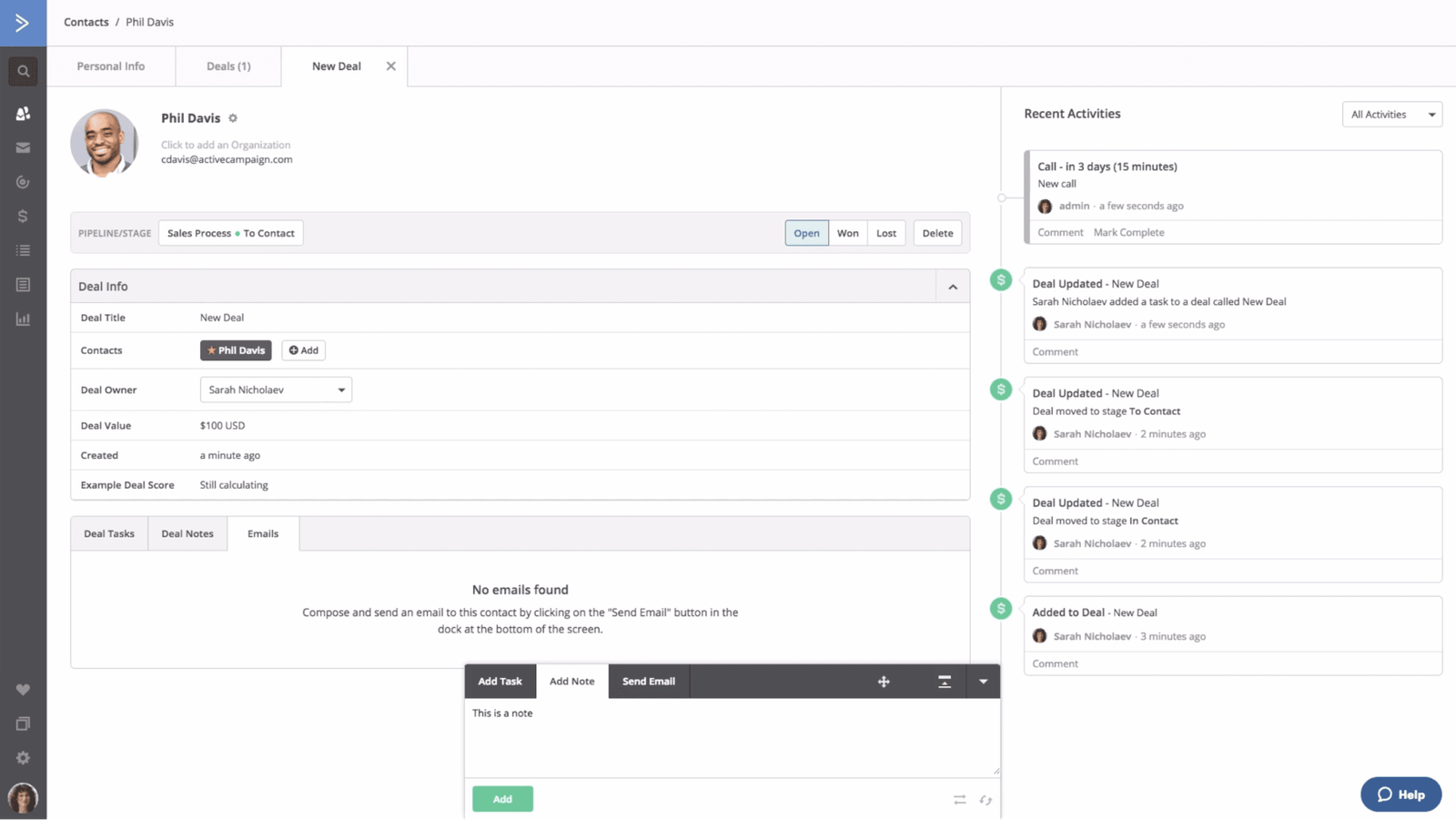
Your team can track every interaction and pick up where someone else left off, making sure no contacts slip out of your funnel. This is key to giving each customer a smooth experience.
2. Lead scoring. Operational CRMs can automate lead scoring and win probability so that you know which leads need to be nurtured with automations and which are ready for more personal outreach.
Lead scoring helps you figure out:
- Which leads are the highest priority?
- Who is most likely to become a customer?
- Which leads will spend the most over time?
3. Sales team automation. An operational CRM can stop sales tasks from piling up or getting forgotten. Automatically assign tasks to your sales team based on customer actions or deal value.
For instance, an ActiveCampaign user can create a sales automation to assign a task based on the deal value. If the deal value is above $500, the CRM will automatically assign a task for a salesperson to call the lead. If the deal value is below $500, the lead will automatically be entered into a nurture campaign.
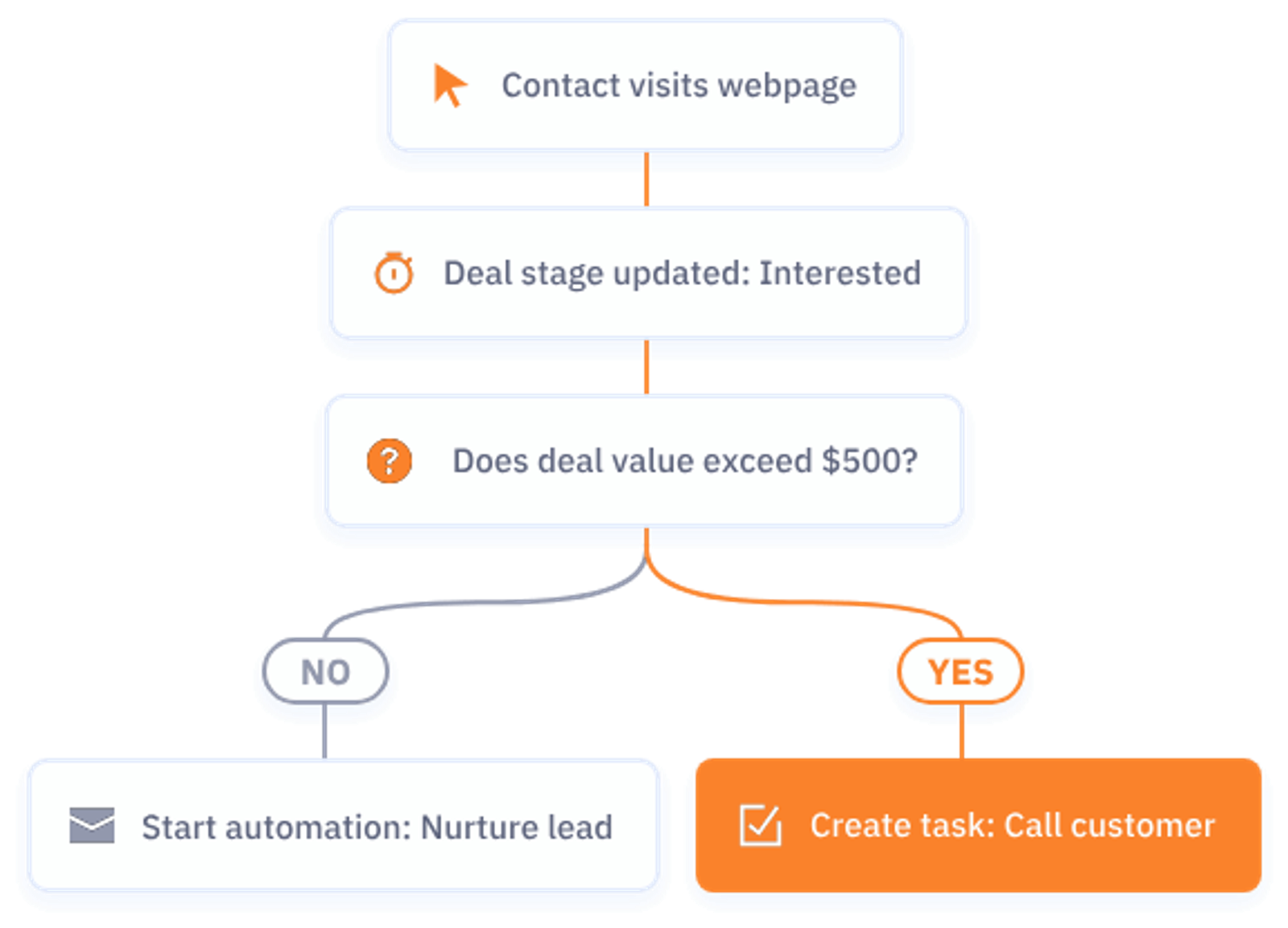
4. Marketing automation. An operational CRM can help you automate how you market to leads and prospects. You can drop people into email funnels based on the information you have about them.
You can automate marketing tasks based on a ton of different factors, such as:
- Account size
- Purchase history
- Product/service interest
- Type of organization
- Organization size
- Estimated close time
- Interaction with your sales team
- Interaction with your marketing messages
- Visits to specific pages of your website
- Almost any other info you can collect
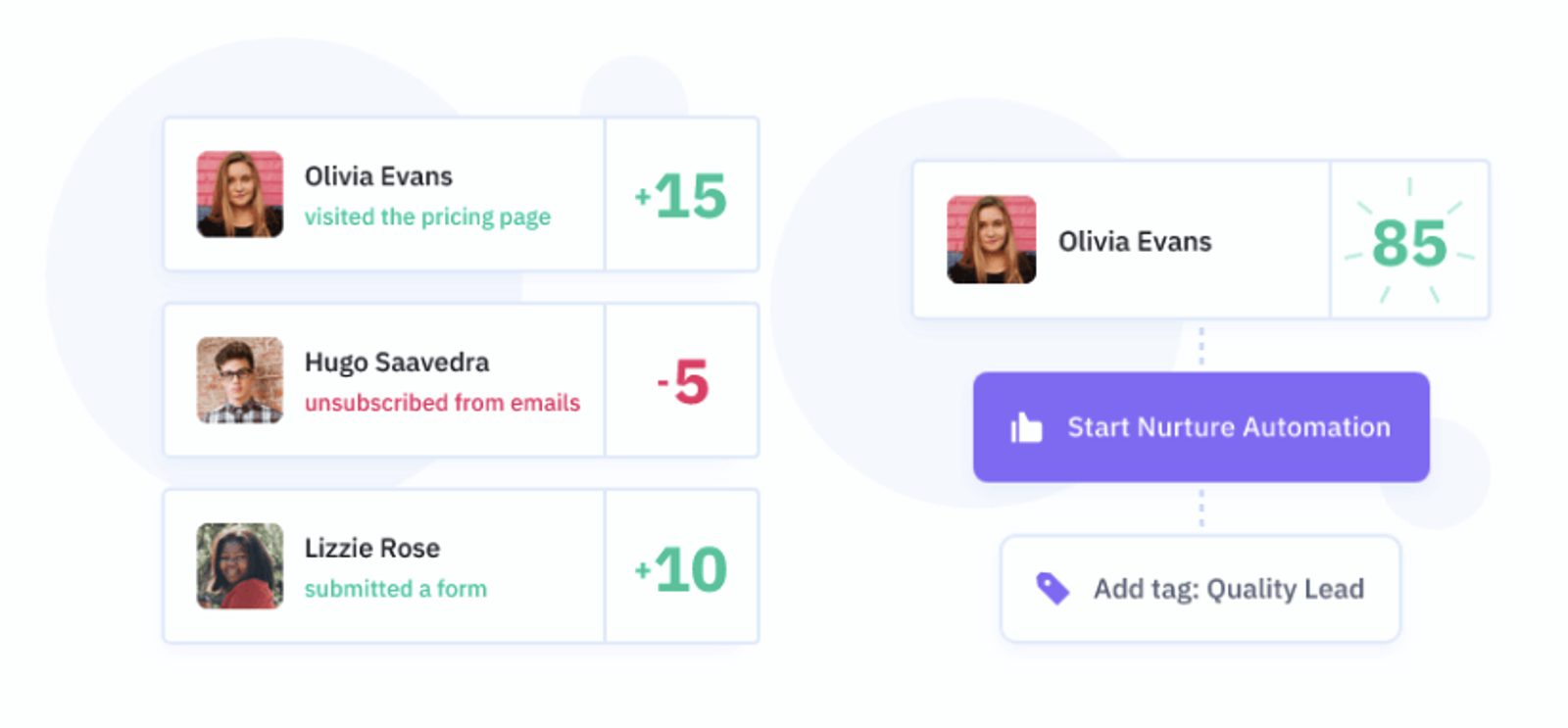
If a lead has spoken with a sales rep several times and downloaded content from your site, they already know who you are. They’re a “warm” lead. You should use a different funnel, shorter than the 1 you’d use for a contact who filled out a form on your site but never spoke to a sales rep.
To learn more about automatically nurturing leads with email funnels, click here.
Who should use an operational CRM?
You should choose an operational CRM if…
- You spend too much time trying to keep contact information organized
- You need a clear view of each customer’s activity and profile
- You want to use lead scoring and win probability but don’t know where to start
- You’re tired of manually assigning each task and lead to your sales team
- You want to scale your email marketing efforts and grow your database
If you want to save time on sales and marketing and keep everything in 1 place, consider an operational CRM.
What is an analytical CRM?
An analytical CRM gathers, organizes, and analyzes your customer data and sales data to help you make better business decisions. This data can include the average deal cycle, customer retention rates, monthly recurring revenue, and any other information you collect.
This is where business intelligence meets contact management. An analytical CRM makes sense of your data—including some you might not even know you have.
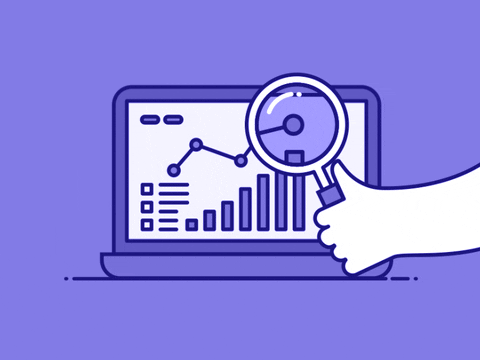
What are the features and benefits of an analytical CRM?
The biggest benefit of an analytical CRM is that it does the data gathering and analysis for you. Here’s how.
1. Data mining. An analytical CRM serves as a data warehouse, storing your data in 1 central, organized, easy-to-analyze database.
Data mining uses statistical analysis to find patterns and relationships in your data. One common use of an analytical CRM is cluster analysis. With cluster analysis, you can segment your customer list based on:
- Age
- State
- Education level
- Gender
- Marital status
- Past purchases
- And a whole lot more!
This lets you target the right people with the right messages.
Other common analyses include linear, logistic, and multiple regression.
Analytical CRMs do the math for you, so you don’t have to create the world’s most complicated spreadsheet to identify sales trends.
2. Cross-sell and upsell opportunities. Analytical CRMs give you insight into your customers’ behavior and past purchases. This gives you the perfect setup for cross-sell and upsell opportunities.
Which customers want to buy which products? An analytical CRM can help you find patterns in purchase history—so you know exactly which people to target with upsells and cross-sells.
3. Buyer persona building. When your CRM gathers and analyzes new customer data, you can build a more complete view of your customers. Understanding your customers’ wants, needs, and personalities can help you improve your marketing.
When you personalize the customer experience with personas, your customers know you understand them. This can make a big difference in your bottom line.
Buyer personas help you better understand your customers and allow you to create better customer experiences. It’s no wonder that 93% of companies said that personalization resulted in revenue growth.

4. Sales forecasting. Analyzing data on your company’s past sales trends can help you predict future demand.
What kinds of sales trends are important?
- If sales spike in the summer and dip in the winter, you need to manage seasonal inventory and staffing.
- If some months are historically higher or lower performing, you can incorporate that information into your sales targets and quotas.
- If contracts tend to get signed at the end or beginning of a specific quarter, you need to know the right time to follow up.
Sales forecasting makes sure that you aren’t surprised by predictable long-term trends.
5. Attribution. Analytical CRMs help you figure out which touchpoints led someone to become a customer. This helps you figure out where your best customers come from—and how to sell to them better.
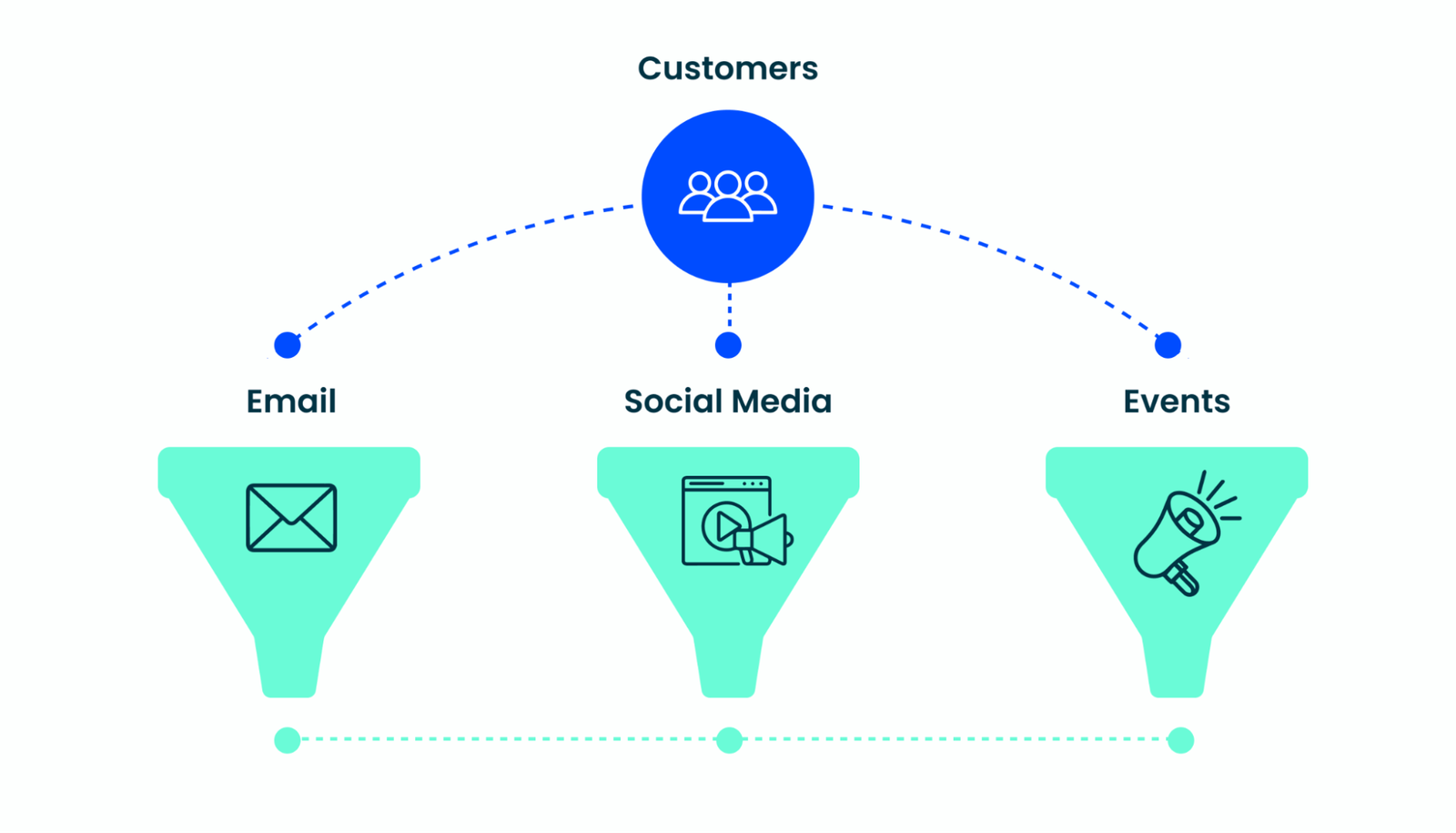
Touchpoints include viewing or clicking on an ad, visiting your website, and any other interactions a potential customer has with your business.
- First-touch attribution links revenue to a lead’s first interaction with your company.
- Last-touch attribution links revenue to a lead’s last interaction with your company before becoming a customer.
- Multi-touch attribution links revenue to more than 1 touchpoint. An analytical CRM with multi-touch attribution assigns different weights (or numerical values) to each touchpoint across the buyer journey. Your CRM attributes revenue to each touchpoint based on its weight.
With attribution, you can see which marketing efforts have the biggest impact. These insights help you do more of what works and less of what doesn’t.
Who should use an analytical CRM?
You should consider an analytical CRM if…
- You want to understand better why customers are (or aren’t) buying your products
- You want to gather more data about your target customer
- You want to build customer personas based on data
- You want to figure out which touchpoints drive the most revenue
- You spend too much time poring over spreadsheets—and not enough time selling
- You want to track your sales KPIs
- You want to improve your sales process or strategy based on business intelligence data
What is a collaborative CRM?
Collaborative CRMs (also called “strategic CRMs”) share customer information across teams. This includes internal and external stakeholders, such as other departments, suppliers, vendors, and distributors.
Don’t worry—analytical and operational CRMs can (and should) still be used for collaboration between teams.
The biggest difference? A collaborative CRM focuses more on customer service, customer satisfaction, and customer retention than on customer acquisition.
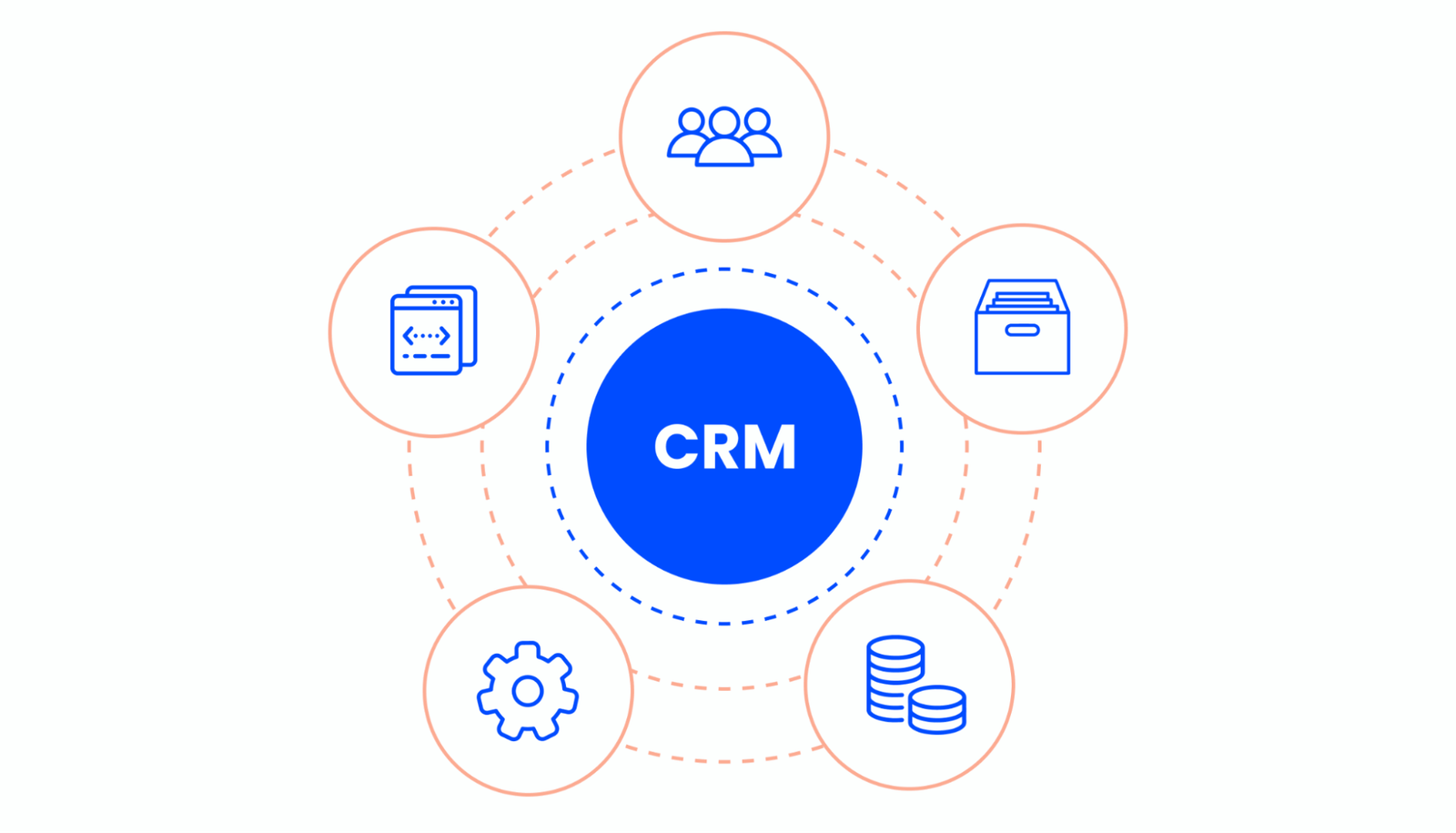
What are the features and benefits of a collaborative CRM?
1. Interaction management. Like an operational CRM, a collaborative CRM helps keep track of each interaction a customer has with your business.
Every customer-facing team—sales, support, community management, vendors, and anyone else who so much as sends an email—has access to a log of customer interactions and team notes.
When you share notes across teams, you get access to a treasure trove of information.
- Feedback from the support team can help you figure out how to sell to future customers.
- Conversations in your communities can help you understand what new products your customers want.
- Notes from sales calls can help your marketing team understand what language to use.
Each team has information about your customers. A collaborative CRM helps break down silos and share that information across teams.
2. Relationship management. A collaborative CRM helps you manage relationships with your customers. When a new customer comes on board, your sales team shares that customer’s preferences, goals, and any other information on their contact profile.
Keep all teams aligned and up-to-date before interacting with each customer. This gives people a better, more personalized experience across the board.
3. Document management. If your team needs access to a contract, technical documentation, or proposal, a collaborative CRM can help. CRMs with document management systems help keep every document from every team organized.
You don’t have to search your desk or pester your finance team to hunt down a pricing agreement—it’s all in 1 easy-to-navigate place.
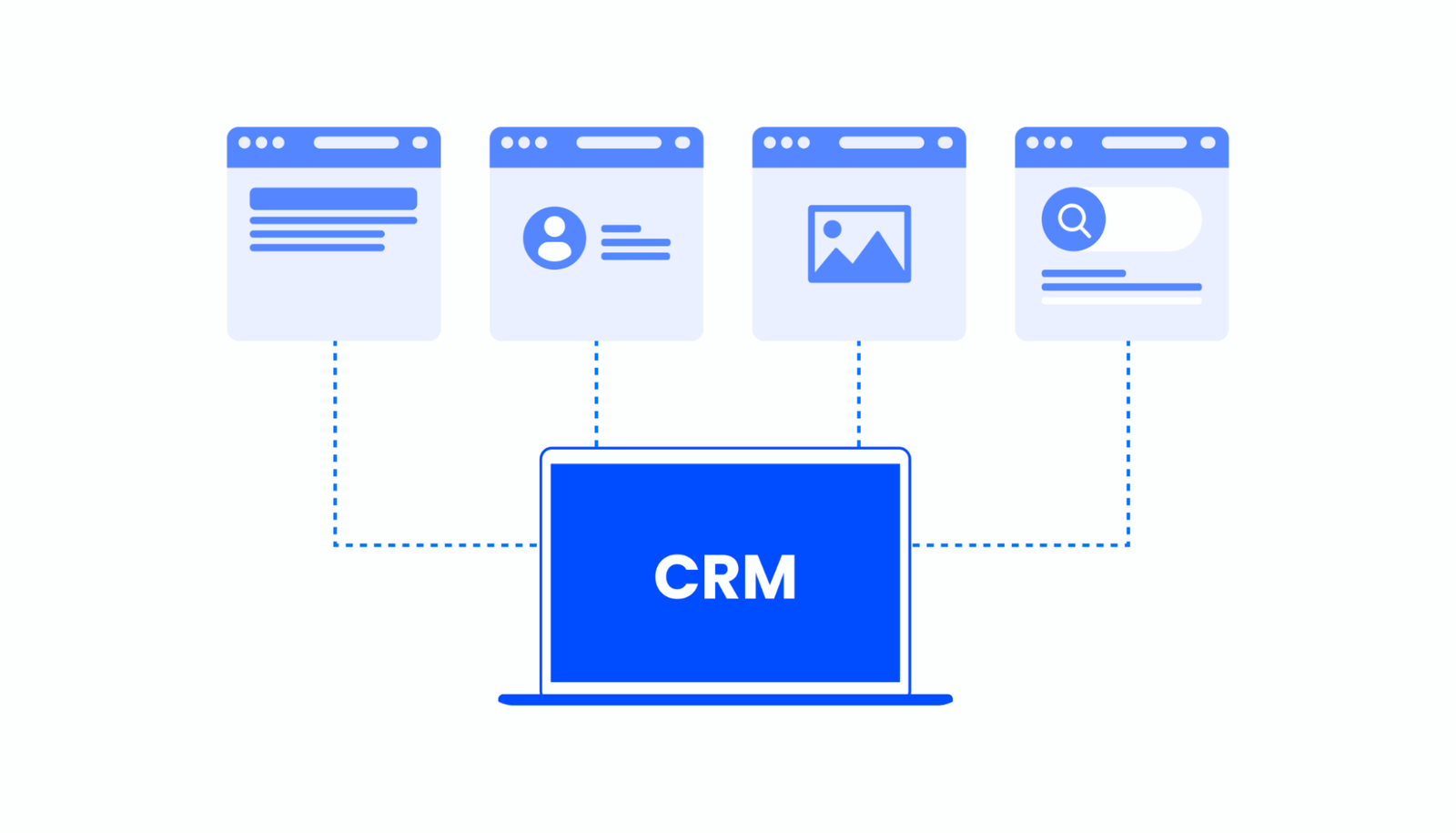
Who should use a collaborative CRM?
You should consider a collaborative CRM if…
- You need to improve communication between departments
- You want to focus on customer retention and loyalty
- Your customers often have specific preferences and needs
- You need to share customer information with vendors
- You want to organize and align customer-focused efforts across your business
Everything You Could Want in a CRM in One Place
Frequently asked questions
We’ve answered some of the most common questions people have about the types of CRM.
What are the benefits of a CRM?
A customer relationship management (CRM) system is a centralized database for information on your customers and potential customers. This allows your team to create better customer experiences through aggregated data and personalized service. This can lead to more conversions, more sales, and greater customer retention.
What are the 3 types of CRM?
The 3 main types of CRM are operational CRMs, analytical CRMs, and collaborative CRMs.
- Operational CRMs give you a holistic view of each customer and save time with sales and marketing automation.
- Analytical CRMs help you make better business decisions by compiling and analyzing customer and sales data.
- Collaborative CRMs prioritize customer service, customer experience, and customer retention by allowing internal and external stakeholders to share information.
Is CRM for B2B or B2C?
CRMs are useful for business-to-business (B2B) and business-to-customer (B2C) sales. Different CRM software, however, offers different features and may be better suited to 1 of the business models.
What is the best CRM?
No single CRM is the best for all businesses. The best CRM software for your company will depend on your business model, size, sales cycle, and other factors. To decide which CRM is best for you, take the time to consider your team’s specific needs.
Find the best CRM for your business
Big choices often start with simply narrowing down your options. Armed with an understanding of the different types of CRMs, we hope you feel a little closer to choosing the right 1 for your business. But how can you make sure you pick the best of the best in that category?
Make sure that your new CRM checks these boxes:
- Integrates with your existing technology
- Gives you live, talk-to-actual-humans support
- Makes it easy to migrate contacts and automations from a previous CRM (if you have one)
- Creates less day-to-day work for your team—not more
With all of the above met—no matter which type you choose—you’ll be well on your way to CRM bliss.
To start saving time with ActiveCampaign’s sales CRM, access your free trial today.








